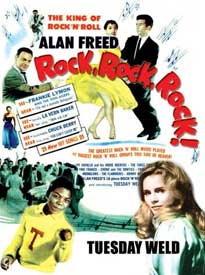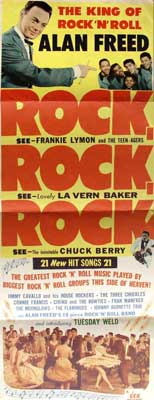 It looks like American Bandstand down at the soda shop, in Rock, Rock, Rock! (1956), a fairly interesting teensploitation musical. It looks like American Bandstand down at the soda shop, in Rock, Rock, Rock! (1956), a fairly interesting teensploitation musical.
Tuesday Weld is the gorgeous blonde who sings "I Never Had a Sweetheart" with the voice of Connie Francis since Weld couldn't sing any better than she could act.
Her boyfriend (Teddy Randazzo) soonafter sings "When It Comes To Love (You'll Have the Things Your Heart Needs)," reminiscent of Bobby Rydell or Fabian, which isn't bad, but doesn't really hint of how good the music is going to be in this film. Randazzo at least can sing his own part!
Tuesday's character's main goal in the film will be to come up with the money to buy a nice dress for the rock 'n' roll dance.
She rather innocently works out a loan shark scheme which backfires on her. That's pretty much the extent of the story.
Alan "Moondog" Freed is having a talent contest, which becomes the excuse for loads of music, framed by the minimal story. The film truly representative of pop music during rock's formative years.
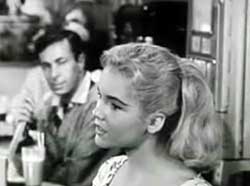 "Baby" (Ivy Schulman) is a little child singer playing the baby sister of Tuesday's best friend Arabella (Fran Manfred). "Baby" (Ivy Schulman) is a little child singer playing the baby sister of Tuesday's best friend Arabella (Fran Manfred).
In a park scene, Baby Ivy performs a novelty number that goes "Don't want a dolly, story book or blocks/ Baby's only happy when she rocks..."
It's amusing how she can't sing, she can't dance, & has awful material, but she's a kid so hey, cute.
Alan Freed really was a big rock promoter & unlike other promoters, he wasn't trying to see how white he could make the music in order to just steal it from the black performers who gave rise to the form. In a decade when segregation still made it difficult to put black & white performers together on the same stage, Freed just did it.
He was in fact a big promoter of African American rhythm & blues, & when as a commercial angle the term "Rock 'n' Roll" arose, he just called R & B "rock" & dared anyone to say it wasn't. What he sure as hell wasn't going to do was turn his back on the people whose music was his hands-down favorite just because racist America was horrified to see images of their own children admiring & interacting with black artists.
In fact Freed's downfall would come a few years later due to his refusal to buckle under to racist norms. His television show The Big Beat (which provided the look & sound that would soonafter be imitated by American Bandstand) was cancelled very suddenly when Frankie Lymon was shown dancing with a white girl. Dick Clark was pretty much boosted into the role as step-father of rock 'n' roll because he was much more willing to tow the line.
The "payola" scandals that ended Freed's career were a real problem in the industry, but Freed was hardly the centermost figure of an industry-wide system. A system which by the way has returned, since most commercial music stations today charge fees to play certain songs.
Freed had been targetted specifically because his mixed-race promotions of music were unacceptable to many law-enforcement thugs, who went so far as to shut down shows that were causing no problem, then arrested Alan for complaining. The payola scandal just made the not-so-secretly racist agenda of the police easier to achieve, though if the intent was to stop rock 'n' roll altogether, that sure as hell didn't work!
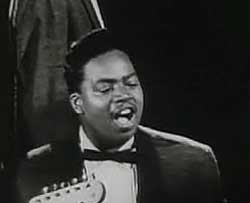 Some of the performers at the contest & the dance to follow aren't actually worked into the main body of the film. Some of the performers at the contest & the dance to follow aren't actually worked into the main body of the film.
There'll be a jump-cut to a performance then jump-cut back to the film. This causes some of the performances to look like separate music films akin to the Snader telescriptions.
Rock Rock Rock as cheaply made & cornpone as it is in places, has some really splendid performers mixed in with a few more ordinary acts, the ordinary tending to be the white guys.
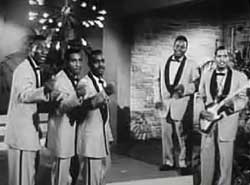 And when Freed introduces Freddie Mitchell with his wailing sax, we're in for a really fine piece of jump-jazz out of which rock 'n' roll was born. And when Freed introduces Freddie Mitchell with his wailing sax, we're in for a really fine piece of jump-jazz out of which rock 'n' roll was born.
Freddie's orchestra is superb, & a great joy to have them on film, even though Freed somewhat drags it down chanting the "lyric" which runs "Rock and roll boogie/ It's the blue star boogie/ We want rock & roll." How could he not have known to keep his mouth shut?
I don't know what kind of agreement Alan had going with Freddie to permit himself to pose as some kind of singer, which he was not.
Freddie isn't even given a proper credit in the film, since his band is billed as Allen Freed & His Band. Allan never again intrudes this ineptly in the film, he just introduces acts.
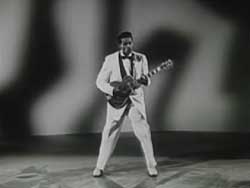 We get to see some really great acts, including the five-guy doowop act the Moonglows singing "I Knew from the Start." Harvey Fuqua sings the lead, backed by the harmonies of Prentiss Barnes, Alexander Graves, Billy Johnson & Bobby Lester. We get to see some really great acts, including the five-guy doowop act the Moonglows singing "I Knew from the Start." Harvey Fuqua sings the lead, backed by the harmonies of Prentiss Barnes, Alexander Graves, Billy Johnson & Bobby Lester.
Chuck Berry puts in a quick cut-away-to-Chuck performance on "You Can't Catch Me" so good it kills, doing such a winning knock-kneed dance as he plays guitar & duckwalks at the end.
Chuck's just good, good, good, kissing his beloved guitar & singing about flying his car over the New Jersey state lines to avoid the police. But one oddity in his lone performance, he seems to have borrowed his suit from the Moonglows who're wearing the same matching outfits when they return later in the film for their second number.
Another top doowop group the Flamingos sing "Would I Be Crying," a tremendous number. The four guys are Jake & Zeke Carey, Johnny Carter, & Nate Nelson.
One of the lesser groups still ain't too bad, Jimmy Cavallo & His House Rockers doing "The Big Beat." The band is two saxes, bass, piano, & drum.
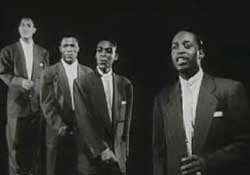 They're doing somethiing closer to jump-jazz than rock, obviously imitating Louis Jordan. Jimmy's the guy on alto sax as well as the vocals. They're doing somethiing closer to jump-jazz than rock, obviously imitating Louis Jordan. Jimmy's the guy on alto sax as well as the vocals.
The same year the band appeared in this film, they became the first white rockers to perform at the Apollo Theater (Buddy Holly played it the following year).
Freed's second show in town will be at the Prom, but in the meantime we get a bit of the "story" & a couple tunes at the soda shop.
Teddy Randazzo, as Tuesday Weld's boyfriend, sings "We're Gonna Rock Tonight" which is a close imitation of "Rock Around the Clock," & Tuesday, again miming to Connie Francis's singing, does "Little Blue Wren," the latter not too bad since it's Connie after all.
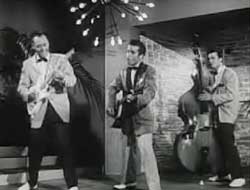 At the Prom, Jimmy Cavallas's band does their second number, the title song "Rock Rock Rock." The lyrics are ultra simple: At the Prom, Jimmy Cavallas's band does their second number, the title song "Rock Rock Rock." The lyrics are ultra simple:
"Rock rock rock (everybody)/ Roll roll roll (everybody)." It could've been an okay number but it needed more personality invested in it, it's kind of white-bread for jump-jazz.
Johnny Burnette is the token rock-a-billy singer doing "Lonseome Train," playing rhythm guitar & shaking his legs Elvis style, assisted by an electric lead guitar & a double bass, together called the Johnny Burnette Trio.
The Moonglows return to sing "Over & Over Again," a great number: "You hurt me over & over again/ And I cried over & over again/ Why do I listen to all of your lies/ I love you, that's why." It has that New Orleans sound associated with Fats Domino or Chubby Checkers.
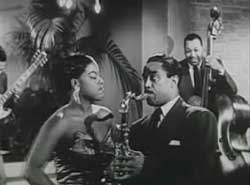 La Vern Baker & The Gliders do "Tra La La." She's a deep dark older gal doing a faux-latin R & B novelty number, backed by a fine band providing a great sax solo. La Vern Baker & The Gliders do "Tra La La." She's a deep dark older gal doing a faux-latin R & B novelty number, backed by a fine band providing a great sax solo.
Brooklyners Cirino & the Bowties are a mediocre harmony group whose "Ever Since I Can Remember" is beareable the way "Sunny Side of the Street" ruined by the similar harmonizers The Four Lads is bearable, but not good. Lead singer Cirino Colacrai is backed by John Granada, Jimmy Piro, & Vince Sepaldo.
One of the great high points of the film is when Frankie Lymon & the Teenagers pop in to sing "Baby Baby" then "I'm Not a Juvenile Delinquent." Frankie's only thirteen & had such a great voice, great dance moves, the Michael Jackson of his day; & he imploded like Michael though in very different ways.
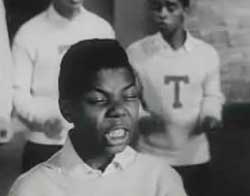 Big Al Sears & Our Big band performs the instrumental "Right Now." This is pure jump-jazz again, & it gets the dance floor hopping with that alto sax lead. Big Al Sears & Our Big band performs the instrumental "Right Now." This is pure jump-jazz again, & it gets the dance floor hopping with that alto sax lead.
One thing this number, & other performances show, is how the move from jump-jazz to rock was to some extent a move from the sax solo to the electric guitar solo. In 1956 the sax had not yet been supplanted, & Big Al Sears' band perfectly captures popular music in transition out of jump-jazz.
A bit can be said about the dancers at the Prom. They were billed as "the Coney Island Kids," & among them you might spot a very young, then-unknown Valerie Harper. As a dance troupe they're unobtrusive & qualified to insure the American Bandstand flavor.
Overall this is better film than most which tried to capture the flavor of rock as it was developing. Many of the early rock films really missed the point -- & wouldn't have had anything better than the unbearable Teddy Randazzo, who as one of the Three Chuckles sings "Won't You Give Me a Chance." Think of the Beach Blanket films with their awful music posing as youth music, complete dorkness.
The lame is represented here by the Three Chuckles & Cirino & the Bowties, but such as these turn out to be the minority rather than main show (although to be fare to Teddy Randazzo, he did compose for Little Anthony & the Imperials "Goin' Out of My Head Over You" & "Hurt So Bad" & had more individual talent than was evident in the Three Chuckles whitebread harmonies).
And compared to Beach Party films' silly notion of what the kids were listenin' to, how great is Rock Rock Rock, thanks to the involvement of Freed who knew who was best & lined up some of the great ones.
copyright © by Paghat the Ratgirl
|
